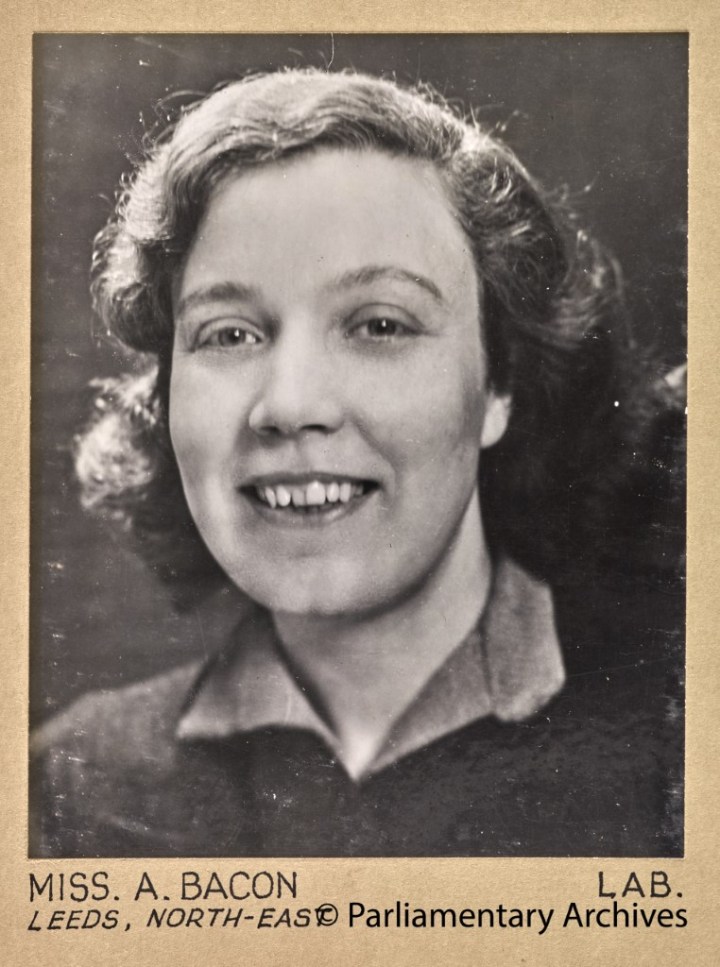The next in our series on women MPs by the House of Commons Hansard Writing Team.
Alice Bacon (1909-1993) and Grace Colman (1892-1971) were both elected as Labour MPs in 1945, having been active in the party for many years. Both were teachers and supported the expansion of educational opportunities.

Alice Bacon grew up in a Labour-supporting Yorkshire mining family and joined the party at 16. A teacher by profession, she was an active member of the National Union of Teachers and became president of its West Yorkshire county association in 1944. She was elected in 1945 for Leeds, North-East and served there and in Leeds, South-East until 1970.
In Parliament, Bacon focused on pay and workplace conditions, housing, education and social issues. She spoke of her hope not only to “abolish poverty, but also the feeling of pauperism” in a moving speech on the 1947 National Assistance Bill, which helped to usher in the modern welfare state. Charles Dickens, she said in the same speech, would have given “rousing support”…to a Bill which banishes for ever that Poor Law system against whose cruelties and miseries he spoke for so long.” She had a long-standing interest in the integration of disabled people into mainstream education and society. She was an early supporter of the abolition of the death penalty, and in 1956 she introduced a Bill against capital punishment.
Bacon counted Herbert Morrison and Hugh Gaitskell among her mentors; she made a brief, touching speech in the House when Gaitskell died in January 1963. Harold Wilson appointed her Minister of State at the Home Office, and then at Education and Science. She was a staunch supporter of comprehensive education and played a major role in its implementation while at Education, arguing it would make “a grammar school type of education…available for far more children than ever before.” Bacon became a Privy Counsellor in 1966 and joined the House of Lords in 1970 as Baroness Bacon of the City of Leeds and of Normanton in the West Riding of Yorkshire.

Grace Colman was the daughter of a canon of Worcester cathedral. In 1914, she won a scholarship to Newnham College, Cambridge, where she studied history and economics and was a member of the first women’s eight to row the Cam. She tutored at Ruskin College, Oxford (1920-25) and at the University of London (1925-40). She was an organiser for the Workers’ Educational Association in London and published two books—“Capitalist Combines” and “The Structure of Modern Industry”. She had joined the Labour party in 1916 and taught at Labour’s summer schools in the north of England for women members.
In the 1930s, Colman served as a magistrate. During the second world war she worked for the Ministry of Labour and the Board of Trade, and as an ARP warden. She stood for election in Hythe and in Hallam, Sheffield, and was finally elected for Tynemouth, in 1945, as the constituency’s first Labour MP. She was devoted to her constituents and turned down an invitation from Prime Minister Clement Attlee to be part of a parliamentary commission to India, preferring to remain at home working for them. She spoke up on local issues, including the fishing industry: “I have been on a number of trawlers and I have been appalled at the conditions”. She also articulated the challenges facing “the ordinary working-class housewife” struggling with post-war austerity.
Colman contested Tynemouth unsuccessfully in the 1950 and 1951 elections—Conservative Irene Ward won the seat—but continued to work for the Labour party, including on women’s education. Her secretary, the mother of Labour MP Joyce Quin, called her an “unsung hero”: “Grace simply wanted everyone to have the opportunity to fulfil their own potential.” Her education work was commemorated through the Grace Colman award, set up to provide free tuition at Labour’s women’s schools.
House of Commons Hansard Writing Team
Images courtesy of Parliamentary Archives
Links
Alice Bacon
Bacon’s speech on 1947 National Assistance Bill
Official Report, 24 November 1947; Vol. 444, c. 1667-70.
Bill introduced for abolition of the death penalty, and debate on Homicide Bill
Official Report, 21 November 1956; Vol. 560, c. 1755.
and Offical Report, 6 February 1957; Vol 564, c. 479-483.
Bacon’s tribute to Gaitskell
Official Report, 22 January 1963; Vol. 670, c. 50.
Bacon on education
Official Report, 24 April 1969; Vol. 782, c. 629-31
Opinion piece in The Guardian by Rachel Reeves MP, biographer
Obituary in The Independent
https://www.independent.co.uk/news/people/obituary-baroness-bacon-1500698.html
Biography of Bacon by Rachel Reeves MP. ‘Alice in Westminster: The Political Life of Alice Bacon’, published in 2016
https://www.bloomsbury.com/uk/alice-in-westminster-9781784537685/
Grace Colman
Colman’s speech in support of fishermen
Official Report, 21 March 1946; Vol.420, c.2067
Colman’s speech in support of housewives
